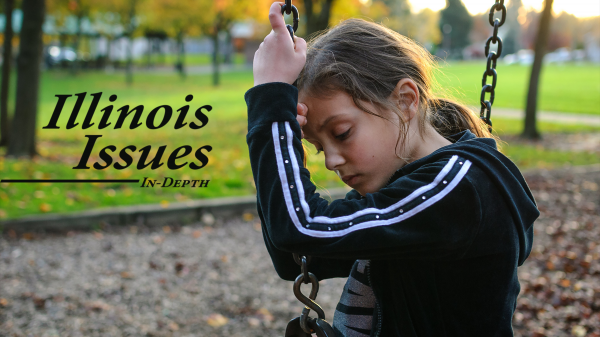Illinois Issues: Children’s Access To Mental Health Care Is In Critical Condition

This photograph is called "Sad' by its creator. Flickr (CC-BY 2.0)
Something was wrong with the little girl. That was clear by the time she was 10 years old. She raged often and was sometimes sullen. By the time she was 13, she was missing school because her anxiety was so severe. She was diagnosed with bipolar disorder, which is marked by periods of depression and irritability interrupted by extreme highs.
“We used to refer to her as Jekyll and Hyde before actually we had any idea of anything,”
said the girl’s mother, who we are calling Jane because she has asked that we not use her name or her daughter’s.
And when the girl was 14, her parents split up and the family’s financial situation meant they were reliant on Medicaid for insurance. For Jane, that meant her daughter was on a waiting list for a year.
The only way we did get her to see the doctor …. we had to hospitalize her and she was the doctor on staff at the hospital.""Jane," mother of a Medicaid patient
“The only way we did get her to see the doctor …. we had to hospitalize her and she was the doctor on staff at the hospital. So we kind of got in the back door that way. The caseload is just so high,” said Jane, who lives in Lake County. “There's just no doctors, there's no psychiatrists for children that take Medicaid.”
The family is hardly alone. About half the children in Illinois are on Medicaid.
“About 850,000 children will experience mental health conditions across Illinois and its access to care can be extremely challenging. We have a psychiatrist workforce shortage, which is a national, as well as local shortage. And oftentimes, treatment is simply out of reach,’’ said Heather O’Donnell, who is senior vice president of advocacy and public policy for Thresholds, a statewide mental health service provider.
“In Illinois, we have children that are psychiatrically hospitalized, and then they don't have placements. Whether it's for outpatient treatment, or residential treatment, there oftentimes is not the availability of services,” she said.
The result is growing suicide rates and increased rates of drug and alcohol abuse. “Often, people turn to drugs and alcohol to self-medicate untreated mental health conditions,’’ she said.
“The consequences of these conditions are substantial,” said Dr. John Walkup, who is head of Child and Adolescent Psychiatry at the Ann & Robert H. Lurie Children’s Hospital of Chicago.

Dr. John Walkup, who is head of Child and Adolescent Psychiatry at the Ann & Robert H. Lurie Children’s Hospital of Chicago.
“Children who are anxious, often fall behind in terms of their interpersonal development and their capacity to take on older adolescents and young adult roles in life. Young people with depression fall behind both socially as well as academically, so they have a hard time transitioning into a full robust adolescence and young adult life,’’ he said.
Walkup said the vast majority of mental health conditions — 75% to 80% — begin prior to age 18. He points to a recent study that showed about 20 percent of Illinois children have an active mental health problem and slightly over half of them have ever been in treatment.
“So about a half of the young people who have mental health problems in the state of Illinois don't get access to care, and we know that the vast majority of mental health problems have very good treatments.”
Some of the great demand is greater awareness of mental health and a bit of an easing of the stigma attached to mental illness.
Nonetheless, finding care in Illinois is a serious challenge.
Sara Moscato Howe, CEO of the Illinois Association for Behavioral Health, says the mental health services in general have suffered from a lack of funding for many years.
“We can talk about the suicide crisis that's escalating, we could talk about the opioid epidemic — there's all kinds of things we are happy to talk about in a public hearing. When you get behind closed doors, and you develop a budget, your priorities come out. And for the last 10 to 15 years, we have not been a priority in this state,’’ she said.
She says 85 of the 102 counties in the state have a chronic shortage of behavioral health workers including psychiatrists, psychologists and social workers. A big part of that situation is because funding to Medicaid providers doesn’t stack up as compared to the rest of the states.
“Our funding rates for services are so low. The rates for psychiatry are very low. So who wants to work in Illinois, where the rates are lower? Then you add a subspecialty, now you're talking about child psychiatry. And that's pretty much a desert, across the state,’’ Howe said. “We have to address the chronic underfunding of the system. We have to address the disparity in rates there — we will never get out from under this without addressing rates.”
According to a study using information that is now five years old, the state spends $77 per capita in mental health rates as opposed to the U.S. average of $133.
There is some hope, advocates say.

As the result of a lawsuit, the state has entered into a consent decree that will look at ways to expand mental health treatment to kids under 21 in the Medicaid program. The state is developing plans for a recent law that encourages school districts to require screening for mental issues along with school physicals. Dr. Walkup ‘s project at the the Ann & Robert H. Lurie Children’s Hospital of Chicago to train pediatricians and primary care providers to do mental health screening got a $15 million gift from the Pritzker Foundation.
Improvements could make a difference in the lives of people like Jane and her daughter.
“The system is so broken it's awful. I don't know how they’ll be able to fix it, and hopefully they can, but something needs to change.”

